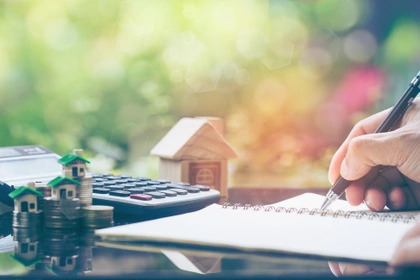Will I be able to take out a loan to help with a deposit?
It’s very difficult to cover a mortgage deposit with a personal loan because most mortgage providers are reluctant to lend to people who have outstanding loans.
Mortgage lenders consider a number of factors when they decide whether to lend you the money. If they believe it’d be risky to lend to you, you’ll find it difficult to get your application approved.
What factors will lenders consider?
Mortgage lenders conduct a credit check and ask you various questions about your financial history when you apply for a mortgage. Each lender uses their own criteria. However, they usually take these three main factors into consideration:
1. Whether you have the funds for at least a 5% deposit
100% mortgages are a thing of the past. This is because most lenders see lending you 100% of a mortgage as too much of a risk – you have a much greater chance of going into negative equity (where you owe more than your house is worth).
The higher your deposit, the less risky you’ll appear to lenders, as there’ll be less chance of going into negative equity. You may be able to secure lower interest rates too.
2. Where you got the funds for your deposit from
If you’ve managed to save the money yourself, lenders may look more favourably on your application. They will also usually accept deposits that are a gift from family or friends, although some lenders will ask the people who gave you the money to sign a document stating that it is a gift that they don’t expect to be repaid.
If your funds are from a personal loan, they’ll question whether you’ll be able to afford repayments on both the loan and your mortgage – it’s less likely you’ll be accepted for a mortgage. They might also think that you aren’t good at managing your money if you’re relying on credit.
3. Your credit history
Like any other provider, mortgage lenders do a credit check to see how much of a risk it is to lend to you. If your credit score is low, you might not be offered a mortgage, or if you are accepted, you may face higher interest rates.
It’s a good idea to build up your credit history before applying for a mortgage to increase your chances of being accepted. You can do this by making payments on time and in full for any credit you owe.
If you have a thin credit history, consider taking out a credit card for bad credit card to increase your credit score – by always paying on time. If you don’t keep to your payment schedule, then you risk damaging your credit history further.
What are the risks of buying a house with unsecured finance?
While it may be tempting to use unsecured finance to purchase a property, there are risks you should consider.
Unsecured loans often have higher interest rates than secured loans and require you to pay the money back over a short period of time.
If you’re trying to make repayments on a mortgage as well as one or more unsecured loans, you might struggle to meet all your repayments on time.
Missing payments could incur late fees. Frequent missed payments may even cause the lender to take legal action against you if your account has already defaulted. It’s possible that using an unsecured loan to pay for a mortgage deposit will cause financial problems and lead you to spiral further into debt.
What other options are available?
If taking out a personal loan to pay for a deposit on a mortgage isn’t the best option for you there are various other routes you can take:
1. Borrowing from family
If you borrow the money for a deposit from a family member then you could avoid the stress of dealing with interest rates and late fees. Borrowing from family will likely be a more informal arrangement and won’t show up on your credit score.
However, a mortgage provider might still see the fact that the money is borrowed as risky. Plus, failing to make repayments to the family member who lends you the money could irreparably damage your relationship with them.
2. Shared ownership
Shared ownership has become more popular as house prices rise. This is where you buy a share in the property and either pay rent to a housing association for the rest - or share the living space with other owners.
This is a more affordable option than buying a whole property, but you have to decide whether you would be willing to share ownership, and potentially your living space, with the other owners.
3. Guarantor loan
If you take out a guarantor loan, a charge is put against your guarantor’s house and they agree to be fully responsible for repayments on that loan if you stop making your repayments for whatever reason.
If you’re struggling to get approved for a mortgage you may find it easier to do so with a guarantor. However, there’s a huge amount of trust involved in taking out a loan with a guarantor because if you stop making your repayments, they become liable for them. This may considerably damage your relationship with them down the line.
4. Help to Buy scheme
Help to Buy is a scheme that helps people in England to get on the property ladder. The current Help to Buy equity loan scheme runs up to March 2021, then it will be replaced by a new scheme from April 2021 to March 2023. Under the new scheme, the government will lend first-time buyers up to 20% of the cost of a new-build home, and up to 40% in London.
You would need to contribute a 5% deposit and you won't need to pay any interest during the first five years of your mortgage.
5. Save up
It may sound obvious but saving for a deposit yourself is the easiest way to build up enough money for a mortgage deposit. It may take a number of years to save that 5% deposit. But once you have the money, you’ll find it a lot easier to be approved for a mortgage than someone who has taken out a personal loan to pay for their deposit.
Saving for a deposit is the best way to play it safe and make sure you have a bit of money behind you to increase the chances of getting a mortgage.
How to save for a deposit
Here are our three top tips on how to save for a deposit:
- budget your finances - Work out how much you need to afford rent and bills per month or week and set that aside when you get paid. Next, set aside the money you need for food and other essentials. The amount you have spare can be used for savings or anything you like. Put the money you plan to save into a savings account as soon as you get paid so you won’t be tempted to spend it. While you probably don’t want to pour all your money into your savings, making cuts on non-essentials like entertainment will help you save much quicker
- put aside spare change - This can be done physically, where you put money into an actual jar. If you’ll be tempted to spend the money, get one that you have to smash in order to take the money out. You can also put spare change from transitions into a savings account. If something costs £1.89, put 11p into your savings to round it up to £2.00. You’ll be surprised how quickly this adds up
- use savings accounts that incur interest - Getting a savings account with a good interest rate will help you save more
Loans for all purposes from £1,000 to £500,000
- Get a decision online
- Know your rate before you apply
- Comparing won't affect your credit score
Intelligent Lending Ltd is a credit broker, working with a panel of lenders. Homeowner loans are secured against your home.

Disclaimer: We make every effort to ensure content is correct when published. Information on this website doesn't constitute financial advice, and we aren't responsible for the content of any external sites.






